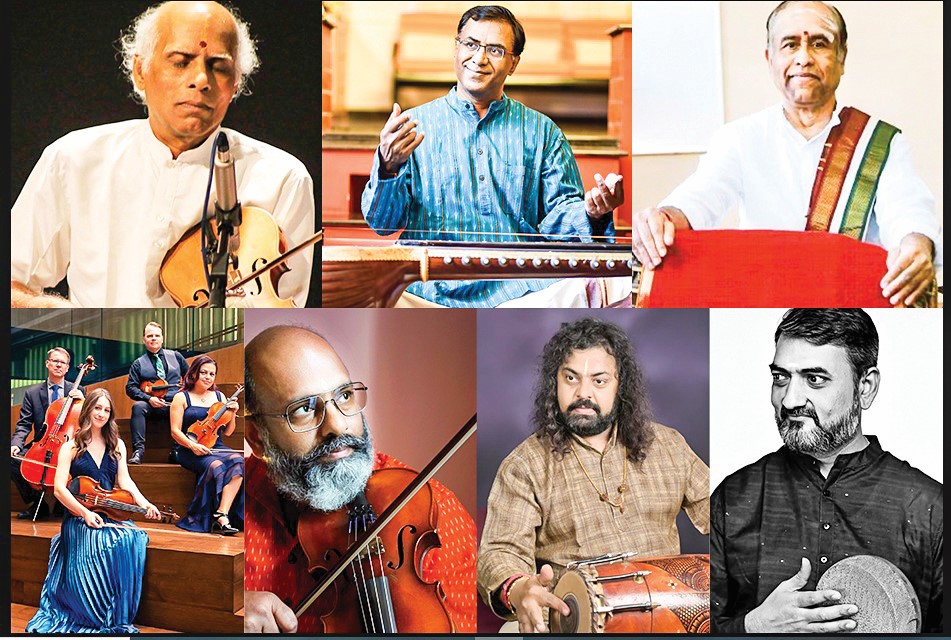The 11th edition of the Melharmony Festival in Madison, USA on the October 19-20 weekend highlighted the works of two trailblazing composers – India’s Oottukkaadu Venkata Kavi (1700-1765) also known as OVK or Venkata Kavi, and his no-less illustrious Western contemporary Johann Sebastian Bach (1685 -1750). This two-day festival was organized by the Melharmony Foundation and curated by its Executive Director Vanitha Suresh.
More than 100 performers and hundreds of connoisseurs of Indian and Western classical music were immersed in a smorgasbord of 20 individual miniconcerts, 5 ensemble presentations, a musical play with live Carnatic music and Bharatanatyam dance, a grand Melharmony concert by Chitraveena N Ravikiran with legends V V Subrahmanyam (VVS), Trichy Shankaran, the versatile Apollo Chamber Players, Patri Sathishkumar and others, culminating with a Carnatic violin duo led by VVS and Sankaran. For me, as a performer and participant, the Melharmony Festival 2024 was a treat to the ears, nutritious and sumptuous food for the heart and soul, and an inexorable inspiration.
Melharmony in world music
The Melharmony concept was discovered and articulated by Ravikiran in mid-2000 during his collaboration with the BBC Philharmonic Orchestra, and subsequently developed from a Western standpoint by Robert Morris of Eastman School Music, NY, USA. Melharmony explores chords and counterpoints based on melodic progression in highly evolved systems such as Indian classical music. This approach sharply contrasts the traditional Western approach centered on harmonic progression. The result is a powerful amalgamation of the Indian framework of ragas based on sequential notes with Western style harmony anchored on multiple notes played simultaneously. Melharmony’s aesthetic appeal is supported by a strong theoretical foundation, and has enchanted multicultural audiences totaling nearly 50,000 in major events.
Two composers, two worlds
The themes of each Melharmony festival over the last few years have centered around showcasing the works of classical Indian-Western composer duos, e.g., Tygaraja-Mozart, Swati Tirunal-Mendelsohn, Dikshitar-Beethoven and Shyama Shastri-Schubert. Both of this year’s heroes, OVK and Bach, lived for 65 years and immeasurably extended the frontiers of their respective systems with indelible and lasting impacts. While Bach is a part of the Western musical Trinity along with Mozart and Beethoven, Venkata Kavi’s works predate the Carnatic Trinity (Tyagaraja, Diskshitar, Shyama Shastry). OVK’s compositions have a distinctively unique flavor with musical beauty and rhythmic variety melded with profound poetic expression and wordplay. For instance, OVK compositions almost always feature segments with multiple speeds, pulse changes, and interspersed rhythmic, solfa and lyrical patterns seldom used by subsequent composers. His works explore an unparalleled diversity of musical, lyrical and rhythmic landscapes ranging from colloquial lyrics with folkish melodies, to classical Tamil/Sanskrit poetry seamlessly woven with intricate rhythms and melodic movements that captivate and enrapture. A significant body of his work has come to light only over the last 80 years or so, stunning artists, listeners and scholars alike.
Diasporic showcase and nurturing
The first day featured about 20 individual 30-minute vocal and instrumental (violin, clarionet and chitraveena) miniconcerts of Venkata Kavi’s compositions embellished with melodic/rhythmic improvisations (e.g., raga aalapana, neraval and kalpanaswarams). Performers included Indian-origin prodigies and students from about 15 states in the USA (e.g., WI, IL, MN, NE, MI, PA, CA, AZ, TX, NJ, NY, TN, OH, IN, MO). A handful of professional artistes also graced the occasion to inspire, interact and perform together with students: Patri Satishkumar (mridangam), Krithika Natarajan (vocal), Rajeev Mukundan (violin), Sriram Iyer (mridangam, kanjira), Bhargavi Balasubramanian (vocal) who is also the creator of the Venkatakavi app for easy access of OVK compositions, and Sowmya Acharya (vocal), the director of Acharyanet – an online Carnatic music learning portal featuring more than 800 learning modules. Each lead vocalist/instrumentalist was supported by melodic (violin) and rhythm (mridangam, kanjira) accompaniments. The audience was engaged and entranced from 9 am to 8 pm, testifying the high quality talent, preparation and skill levels despite little prior synchronized practice with co-artistes. Concerts featuring emerging student artistes together with senior professionals were particularly inspiring and thrilling.
Dance, musical, grand concerts, cross-cultural inclusivity, innovation
Forenoon of day two opened an hour of dance interpretations of OVK’s compositions by students from Meenakshi Ganesan’s Kalaanjali Dance Company. This was followed by a highly entertaining and educative multi-act musical stage play on the Life of Oottukkadu Venkata Kavi crafted by Prof. Ranganathan’s Triveni Arts from Chicago interwoven live Carnatic singing by Vanitha Suresh’s Arohana Arts Academy, and live Bharatanatyam by Natyarpana’s Kripa Bhaskaran.
The Grand Melharmony concert in the afternoon commenced with classical presentations of Bach’s Double Concerto and Brandenburg movement 3 by Apollo Chamber Players and Ravikiran’s elaborate rendition of OVK’s masterpiece Venugaanaramanaa in raga Todi. The subsequent joint presentations of Melharmony pieces by Apollo and Ravikiran were soulful, bright and elevating. A Mouthful of Universe in raga Umaabharanam commenced with exquisite “harmony sangatis” and segued into OVK’s composition depicting Toddler Krishna revealing the universe to this mother Yashoda. Commander in raga Gowla musically kindled martial sentiments and was followed by the rendition of OVK’s Senapate that invokes Lord Karthikeya as the commander-in-chief of the Devas. The coming together of two rich musical cultures through Melharmony underscored the synergy between shared values of global harmony, and highlighted the inclusive transcendental values of Indian music that is inextricably underpinned and nourished by Sanatana Dharma traditions. The two-day festival culminated with the rendition of OVK’s timeless Alaipaayuthey kanna in raga Kaanadaa in a Grand Finale concert by VVS and Sankaran, who were also honored with lifetime achievement awards for their 160 years of cumulative contributions to Indian classical music and world culture. The Mayor of Middleton, WI declared October 22, 2024 as Chitraveena Ravikiran Day in recognition of his outstanding contributions to world harmony through music.
Ganpati Ramanath is John Tod Horton Professor of Engineering at Rensselaer Polytechnic Institute, Troy, NY, USA (https://faculty.rpi.edu/ganpati-ramanath). He is a passionate lifelong student, performer, and connoisseur of Indian classical music with deep interest in exposing

